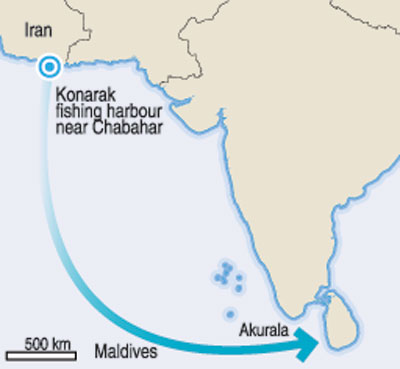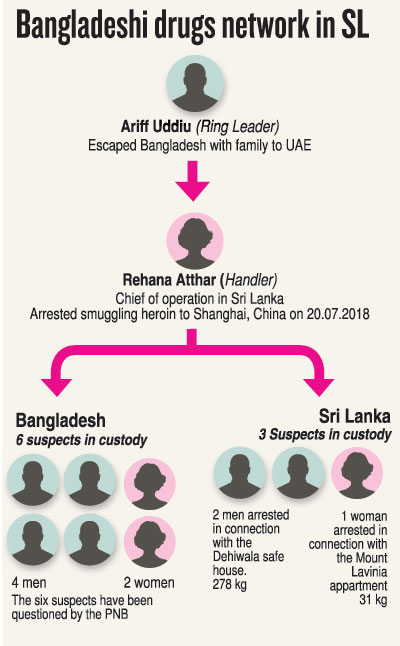News
Another haul of heroin: This time on a fishing vessel from a port in Iran
SLN Suranimala, a Navy fast patrol vessel, had been shadowing a suspect fishing vessel in international waters off the South Western coast of Hikkaduwa last week. Onboard was a team of Special Task Force (STF) commandos, Police Narcotic Bureau (PNB) officers and Navy personnel prepared to board that boat.
At dusk, the vessel entered Sri Lankan territorial waters and changed course towards the Akurala-Telwatta coastline. The Suranimala moved in, trying to raise the vessel on the international maritime communication frequency. It had no response. The fishing vessel attempted to flee but could not outrun the Navy patrol vessel. The Suranimala instructed the crew to stop her engine and move towards the bow of the vessel as they came alongside. The team boarded. After detaining the nine-member crew, they found 107 kgs of heroin in four sacks hidden in the engine room. The find brought the total volume of heroin apprehended by Sri Lankan authorities in the first three months of this year to 840 kgs, already exceeding the total of 731 kgs taken in to custody in 2018. The haul has a street value of around Rs 1,200bn, police said.
The crew who were Iranians, including a suspected 17 year-old schoolboy who was on board, were remanded till April 5. The vessel had originated from the Konarak fishing port in Iran and had been at sea for 14 days, said SP Ruwan Gunasekara, police spokesman. Several mobile phones, a satellite phone and a GPS navigation system were found on board. The men had not been fishing although they were in a fishing boat. The Iranian embassy had provided an interpreter to assist the police with their inquiries.
 The Iranians had no travel documents. They had dry rations and fresh water for another two weeks. The skipper had reportedly been approached by a drug trafficker to move the consignment, a PNB source told the Sunday Times, requesting anonymity. He suspects that the skipper convinced the other crew members (fishermen from his village, including his brother) to make the journey to deliver the narcotics. They had been promised a handsome reward for a successful delivery. One of the suspects had claimed that, two days after they left Konarak, a smaller boat had towed a submerged package containing the heroin. Some of the heroin packets had become damp due to a poor watertight seal and had been laid out on the deck of the vessel to be dried before being repacked in the sacks and concealed in the engine room, a PNB source recounted.
The Iranians had no travel documents. They had dry rations and fresh water for another two weeks. The skipper had reportedly been approached by a drug trafficker to move the consignment, a PNB source told the Sunday Times, requesting anonymity. He suspects that the skipper convinced the other crew members (fishermen from his village, including his brother) to make the journey to deliver the narcotics. They had been promised a handsome reward for a successful delivery. One of the suspects had claimed that, two days after they left Konarak, a smaller boat had towed a submerged package containing the heroin. Some of the heroin packets had become damp due to a poor watertight seal and had been laid out on the deck of the vessel to be dried before being repacked in the sacks and concealed in the engine room, a PNB source recounted.
The Interception was made possible through STF intelligence, the police spokesman said. There was not adequate information to surmise that part of the heroin had been thrown overboard, he said, the investigation was still in its early stages. The mobile phones, satellite phone and the GPS navigator are to be subjected to forensic analysis by order of the court. The vessel is to be taken to Trincomalee and kept in Navy custody. The support and training for countering drug and organised crime given by the United Nations Office on Drugs and Crime (UNODC) was appreciated by the Police and the Navy.
“The Beruwala-Dondra coast line is vulnerable,” the PNB source pointed out, adding that the South-Western coast was dotted with a number of small unregulated fishing villages and had small vessels which can head beyond the territorial waters and rendezvous with a boat such as the Iranian one which was apprehended. “It only takes a few minutes to transfer a consignment from the larger vessel to dinghies,” he said. The PNB has long been understaffed and poorly equipped, he complained, but said things were changing slowly. “We perform with bare-bones facilities, our vehicle fleet is small and outdated, some of them are easily identified by drug peddlers as ‘police vehicles’ from afar,” he said. “I give full credit of our successes to our operatives on the ground. They are young and passionate.” Modern equipment, tools and training are very important, the source asserted. There is only so far they can go on human effort alone. Recently, funding was allocated for some hi tech equipment to be procured to aid the counter-narcotics effort. “We are also seeing a lot of support from other Government stakeholders and from the general public these days,” he said.
| The travelling cosmetics ‘sales person’ and more on Bangladeshi drug network
Investigation by the DNC had led to the arrest of six individuals: four men and two women. However, the ring leader identified as Ariff Uddiu had fled Bangladesh with his family to avoid arrest. He is suspected to be hiding in United Arab Emirates (UAE). Ariff is described as a businessman with links to Ahamed Hossen Sumon, a known Pakistani drug kingpin. Efforts are underway to obtain Interpol ‘blue notices’ on both of them. Two weeks ago, a PNB delegation visited Bangladesh to interview the six suspects. “We have made progress and are continuing with the investigation,” the PNB source said. “The opportunity to interview the suspects in Dhaka was valuable and the Bangladeshi police were very supportive.” PNB suspects that, under the instructions of Ariff, Rehana Akthar, another Bangladeshi was the key handler for a number of couriers who carried out deliveries for the network. She is suspected to have been the organiser of the Kawdana Road safe house in Dehiwala where 263kg of heroin was found along with 5kg of Cocaine and 13 travel bags with false bottom compartments. Detectives suspect that the small concealed compartments can hold 2-3kg of narcotics and were used to smuggle narcotics through airports. In one such attempt, Rehana had travelled to Shanghai from BIA on July 20, 2018, where she was arrested by law enforcement authorities after the drugs were detected in her bag. She is currently held in Shanghai. Her associates had apparently not known what happened to her. The presence of the 13 bags points to several successful drug runs, detectives believe. Police have learned from the suspects that the couriers flew frequently to India, Bangladesh, Shanghai and Kuala Lumpur in Malaysia to deliver drugs hidden in their travel luggage. Rehana had registered as an official travelling salesperson for several international cosmetics manufactures and used it as a cover to frequently go “for business” to several destinations. “She has travelled with bulk quantities of cosmetics, and had often claimed that she was delivering new samples to new clients,” the PNB source said. The PNB also believes the suspects who were arrested with the record 294.49 kg of heroin seized in two mini vans in a Wellawatte supermarket parking lot, were also in charge of transporting bulk quantities of heroin from shipments to safe houses for the Bangladeshi network. | |


 The PNB has unravelled more details of the now dismantled Bangaldeshi network. Information gained by questioning three Bangladeshi nationals arrested in connection with heroin stashes in Dehiwala and Mount Lavina had aided the PNB to provide information to their Bangladeshi counterparts in the Department of Narcotics Control (DNC).
The PNB has unravelled more details of the now dismantled Bangaldeshi network. Information gained by questioning three Bangladeshi nationals arrested in connection with heroin stashes in Dehiwala and Mount Lavina had aided the PNB to provide information to their Bangladeshi counterparts in the Department of Narcotics Control (DNC).